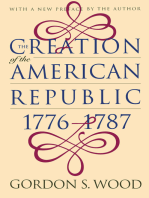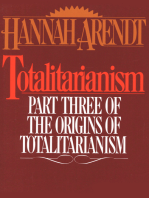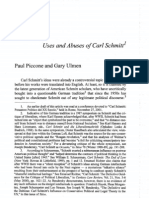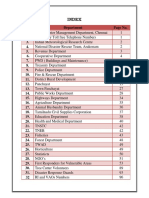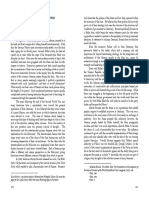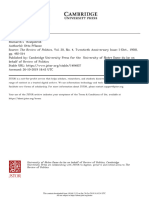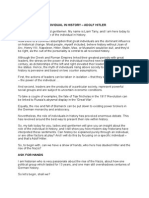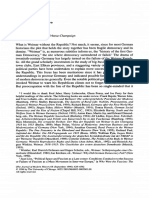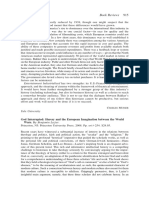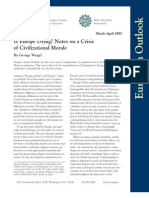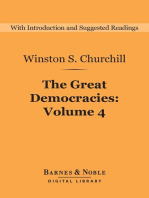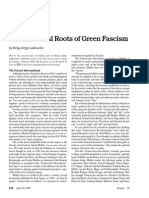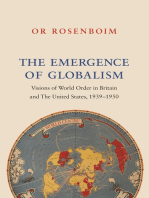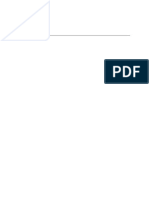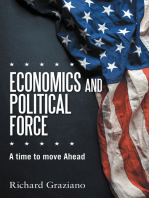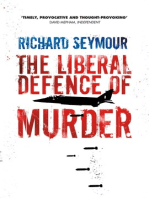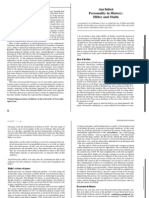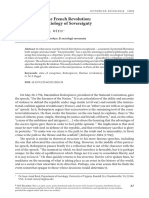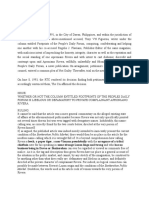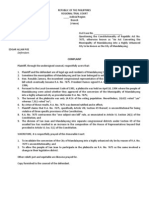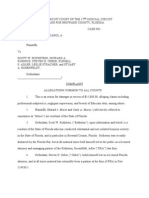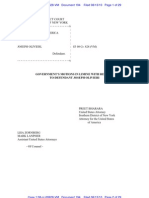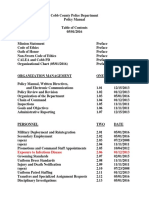The Real Origins of Realpolitik-Mar.14-TNI
The Real Origins of Realpolitik-Mar.14-TNI
Uploaded by
P.Copyright:
Available Formats
The Real Origins of Realpolitik-Mar.14-TNI
The Real Origins of Realpolitik-Mar.14-TNI
Uploaded by
P.Copyright
Available Formats
Share this document
Did you find this document useful?
Is this content inappropriate?
Copyright:
Available Formats
The Real Origins of Realpolitik-Mar.14-TNI
The Real Origins of Realpolitik-Mar.14-TNI
Uploaded by
P.Copyright:
Available Formats
28/2/2014
The Real Origins of Realpolitik
Published on The National Interest (http://nationalinterest.org)
Source URL (retrieved on Feb 28, 2014): http://nationalinterest.org/article/the-real-origins-realpolitik-9933
The Real Origins of Realpolitik
From the March-April 2014 [1] issue Share Share Share Share | More More [2] John Bew [3] | February 25, 2014 John Bew [3]
IN 1934, a young British historian published his first book, The Italian Problem in European Diplomacy, 18471849. In it, he announced that a nations foreign policy is based upon a series of assumptions, with which statesmen have lived since their earliest years and which they regard as so axiomatic as hardly to be worth stating. It was the duty of the historian, he wrote, to clarify these assumptions and to trace their influence upon the course of every-day policy. By that apodictic verdict A. J. P. Taylor, who soon became one of the greatest British historians of the past century, meant realpolitik, which he believed was the true motor of international relations, with moralism serving at best as a pious smokescreen for a battle for power, or, as he put it in the title of one of his best books, for the struggle for mastery in Europe. Since then, realpolitik has had its ups and downs, both in Britain and America. In the late 1930s, for example, it became a convenient excuse among much of the British aristocracy for doing nothing in the face of Nazi terror and aggression, but, then again, it also underlay Winston Churchills declaration that he would sup with the devil to defeat Hitler, which is what he did in forming a wartime alliance with Stalin. Now that this elastic term is once again coming back into vogue, it is worth taking up Taylors challenge again.
http://nationalinterest.org/print/article/the-real-origins-realpolitik-9933 1/12
28/2/2014
The Real Origins of Realpolitik
For what does this portentous Teutonic word actually mean and what implications, if any, does it hold for the assumptions of contemporary Western statesmen? As realpolitik undergoes a renaissance in the English-speaking world, it is surely worth investigating what the word, coined in 1853, was originally supposed to entail. The answer to that question might surprise but will also enlighten. Real realpolitik has been used and abused beyond all recognition over the last 160 years. But the original concept is still relevant to the challenges of the twenty-first century, if not quite in the way one might expect. It contains notions within it that both bolster and act as a useful counterweight and corrective to the mantras of modern American realism. Real realpolitik, you could say, is ripe for excavation and rediscovery. The reasons for the most recent return of realpolitik are no mystery. The optimism and sense of triumph which crept into Anglo-American political culture following the end of the Cold War and which peaked with the toppling of Saddam Husseins statue in Baghdads Firdos Square just over ten years ago have been replaced by the return of history and the end of dreams. As periodically happens when the world becomes a more challenging place, a slew of new books on Niccol Machiavelli have appeared on both sides of the Atlantic, including offerings by Jonathan Powell (Tony Blairs former chief of staff) and Philip Bobbitt. Last December, in a review of four recent books on the Florentine statesman in the Atlantic, Michael Ignatieff announced the coming of the latest Machiavellian moment (a phrase introduced by the historian J. G. A. Pocock in 1975). By that he meant an instance when public necessity requires actions that private ethics and religious values might condemn as unjust and immoral. Other familiar heroes of realpolitiksuch as Lord Castlereagh and Count Metternich (the focus of Henry Kissingers A World Restored) and Otto von Bismarck and George F. Kennanare also enjoying a return to prestige. This time around, realpolitik also has some new friends and unlikely advocates. The most liberal president to inhabit the White House in many years has been as realist as any of his predecessors in the conduct of foreign affairs, with a zero-sum security policy in which interests are paramount. Last May, the German weekly Der Spiegel ran an article declaring that President Obama was the heir to Kissingers realpolitik, quoting National Interest editor Jacob Heilbrunn to the effect that he may even start speaking about foreign affairs with a German accent. Everybody always breaks it down between idealist and realist, said Obamas then chief of staff Rahm Emanuel in April 2010. If you had to put him in a category, hes probably more realpolitik, like Bush 41 . . . youve got to be cold-blooded about the selfinterests of your nation. In the 1990s, some regarded realpolitik as a thing of the pasta relic of the Cold War and a needs must approach to the world which could now be tossed into the dustbin of history. Even at the height of their influence, Western realpolitikers have often faced resistance and criticism from within their own societies. As a foreign import, lifted from the heart of the great Anglo-American bogeyman of the two world wars, the word does not sit comfortably alongside such soothing terms as enlightenment, morality and virtue. In a world where great-power rivalries have returned, however, realpolitik is once more discovering a receptive audience. The chastening of American ambitions in the Middle East also allows realpolitikers to point out, with some justification, that idealism can lead to worse moral outcomes than the cool, circumspect approach to statecraft that they purport to employ. So the exponents of realpolitik have rediscovered their voice and their swagger. Yet realpolitik is one of those words borrowed from another language that is much used but little understood. Its true meaning remains occluded by the fact that it has so often been caricaturedbut also because realpolitikers caricature the naive idealists whom they set
http://nationalinterest.org/print/article/the-real-origins-realpolitik-9933 2/12
28/2/2014
The Real Origins of Realpolitik
themselves up against. I will leave it to the self-described realists to explain in greater detail the origins and meaning of realism and realpolitik to our confused journalists and politicos, said Robert Kagan in 2010, in a discussion of President Obamas realist credentials. In fact, few satisfactory definitions exist, largely because international-relations theorists have remained uninterested in its historical origins. In picking up the gauntlet thrown down by Kagan, thento explore the origins and meanings of realpolitikone discovers some surprising answers. Both realists and their critics should take heed. Rediscovering real realpolitik is, in fact, a more useful exercise than simply dusting off a copy of Machiavellis The Prince. We can do better than revert to Renaissanceera statecraft every time we get our fingers burned. That is because real realpolitik was born in an era that more closely resembles the one in which we find ourselves today. It emerged in mid-nineteenth-century Europe from the collision of the Enlightenment with the realities of power politics: a world that was experiencing a unique combustion of new ideas about freedom and social order alongside rapid industrialization, class war, sectarianism, greatpower rivalry and the rise of nationalism. In other words, it was a response to the quintessential dilemmas of modernity, some of which we are still grappling with today. Above all, the creation of the concept of realpolitik was an early attempt to answer a conundrum that has been at the heart of Anglo-American foreign policy ever since: how to achieve liberal, enlightened goals in a world that does not follow liberal, enlightened rules; and how to ensure political and social progress in an unstable and unpredictable environment. REALPOLITIK IS NOT, as is often assumed, as old as statecraft itself. Nor is it part of a seamless creed stretching back to Thucydides, Machiavelli, Hobbes and Richelieu, though, as Jonathan Haslam points out in No Virtue Like Necessity: Realist Thought in International Relations since Machiavelli, it has a place within it. It is something distinct from raison dtat, strategic thought or Machiavellianismthough all played a part in its formulation. Realpolitik is of more recent vintage. The neologism was invented by the German thinker Ludwig August von Rochau in his 1853 treatise Grundstze der Realpolitik (The Principles of Realpolitik). Rochau, who added a second volume in 1869 and wrote a total of eleven books, is a largely forgotten figure today. His work has attracted comment in his homeland, including Natascha Dolls perspicuous 2005 study, but has never been translated into English and there are no extended discussions of his life and work in the English language (notable exceptions here are brief mentions in Jonathan Haslams history of realism and James Sheehans work on nineteenth-century German liberalism). So who was Rochau and what did he mean by the word realpolitik? Rochau, to borrow a loaded phrase, was what might be called a liberal mugged by reality. The illegitimate son of an officer of the Braunschweig hussars, he was a publicist, journalist and radical participant in the Vormrz, the movement for liberal political reform in the German states. The efforts of this liberal movementlike those of its sister movements across Europeculminated in the rebellions of 1848, which were intended to establish constitutional and representative government. Rochau, who had been forced into exile before the uprising, tried to attain a seat in the liberal Frankfurt Parliament, which was established that year. Although he failed, he became a well-known figure in the National Liberal Party and eventually became a deputy in the German Reichstag in 1871. In some respects, the 1848 revolutions were nineteenth-century Europes equivalent of the Arab Spring. Uprisings that began in the name of freedom and constitutional rights quickly fell victim to other political phenomena. The liberal gains of 1848 were soon lost as the would-be
http://nationalinterest.org/print/article/the-real-origins-realpolitik-9933 3/12
28/2/2014
The Real Origins of Realpolitik
revolutionaries were swatted down by coercive governments who restored their authority or were overtaken by more powerful social forces such as class, religion and nationalism. The liberal dream of a united Germany under the rule of law was thwarted. In the multifarious states and principalities of Germany, autocrats, monarchists and the landed classes quickly reestablished their control and scattered the revolutionaries into prison or exile. Over the following two decades, Germany was indeed to be united but not by the means that the men of 1848 envisaged. Rather than constitutionalism and representative government, it was the blood and iron of the Prussian chancellor, Otto von Bismarck, that forged the creation of the German Empire in 1871. Nor was this all. In France, the Second Republic was established in early 1848 and the French people were granted universal suffrage. But democracy did not prove to be a vehicle for liberalism, as might have been expected. The people (chiefly the peasants) elected Napoleons nephew Louis, who used this mandate to abolish the representative assembly, marginalize the liberals and install himself as emperor in 1852. It was the implosion of the 1848 French revolution that Karl Marx wrestled with four years later in The Eighteenth Brumaire of Louis Napoleon, notingreferring to the resurrection of Bonapartismthat history tends to repeat itself, the first time as tragedy, the second time as farce. In Italy, meanwhile, where Rochau also visited, a series of local rebellions were swiftly suppressed. As Rochau watched the dreams of the liberals dissipate in smoke, he thought it time for some hard thinking. Liberals had to get real. The castles that they have built in the air have evaporated into blue mist, he wrote. A work that had begun with aimless enthusiasm and carried out with an overestimation of ones capabilities ended in dishonour and injury. It was as an antidote to their failure to understand the nature of power and politics that this budding realist invoked the need for a new realpolitik. This was juxtaposed with idealpolitik, which had inspired Rochau and his comrades but won them no real gains. Realpolitik does not move in a foggy future, but in the presents field of vision, he wrote. It does not consider its task to consist in the realisation of ideals, but in the attainment of concrete ends. Rochau was far from ready to give up on the ideas he had held so far. In his view, the great achievement of modernity had been to undermine the notion that might is right in politicsor that kings or certain classes had a God-given right to rule because they were strong. But that did not mean liberals could simply dismiss the laws of politics. In making such progress, they had mistakenly assumed that the law of the strong had simply evaporated overnight. In reality, this law was as unavoidable as the law of gravity over the material world. The foundational truth of politics was the link between power (Macht) and dominance (Herrschaft). Rather than abandoning his liberalism, he challenged his fellow liberals to think of smarter ways to achieve their goals. They had much to fight for. The regimes that had been restored after 1848 were anachronisms because they did not adequately reflect the balance of social forces within German society. The only viable government for Germany, he argued, was one that was constructed around and harnessed the full potential of the Mittelstand (the middle classes). But the intellectual progress made by the Enlightenment had hit the brick wall of reality. To get through that wall, it needed more than ideological purity. When it became a matter of trying to bring down the walls of Jericho, the Realpolitik thinks that lacking better tools, the most simple pickaxe is more effective than the sound of the most powerful trumpets. The strange afterlife of realpolitik showed just how difficult it was for liberals to balance their
http://nationalinterest.org/print/article/the-real-origins-realpolitik-9933 4/12
28/2/2014
The Real Origins of Realpolitik
ideals with a true understanding of means and ends. After Rochau, the concept became entrusted into the hands of the historian and fellow National Liberal politician Heinrich von Treitschke, a virulent anti-Semitehis credo was the Jews are our misfortunewho set out to show the German people how brilliant Realpolitik is. But Treitschkes influenceand his ideas of racial struggle and warrepresented an increasingly rightward turn in German liberalism. Among the National Liberals, liberal values were increasingly subordinated to the German national cause, which had been seized upon and exploited by Bismarck. Rochau had regarded anti-Semitism as repugnant, absurd and delusional. Rochau remained a fierce critic and opponent of Bismarck until his death in 1873. Bismarcks government banned the publication of the weekly journal that Rochau edited in the 1860s. By a strange twist of fate, however, the phrase that Rochau coined became increasingly associated with Bismarck himself. Detached from its original meaning, it was used to describe Bismarcks brand of practical and ruthless statecraft in the domestic and international arena: his astute management of different social forces within the state and his ability to combine diplomacy with the threat of force. Thus the true meaning of realpolitik began to be drowned out as it was harnessed by conservatives for a very different cause. For those watching the rise of the German nation from outside, therefore, realpolitik soon became a byword for German dastardliness. FROM ITS German origins, realpolitik seeped into the English language (and the AngloAmerican conscience) in two ways, and in two distinct waves. The first was in the slow buildup of Anglo-German antagonism in the late nineteenth century. For Britons, increasingly conscious of threats to their position as the leading global superpower, realpolitikas practiced by Bismarck and then the kaiserwas an unpleasant and disconcerting discovery. It was taken to imply cynical and uncivilized conduct on the international stagea lack of respect for the treaties and laws that provided some semblance of order in global affairs and a fetishization of naked self-interest as an end in itself. The first mention of realpolitik in the English language came in 1872. It was in a translation of an attack on Rochau by the Prussian nationalist Constantin Frantz, who believed that the very notion of realpolitik betrayed the Christian spirit of benevolence that was central to the essence of liberalism. After this, the word was barely mentioned again until the 1890s, when it began to seep into the press with growing frequency, as Wilhelmine Germany became an increasingly aggressive and assertive actor on the international stage. Following Frantz, realpolitik was identified as the source of a sort of gangrene in German philosophy and intellectual life. The traditions of Goethe and Kant, which had been so admired in England, had been marginalized by what seemed to be a neo-Machiavellian obsession with power and the interests of the state. In 1895, the Times, for example, bemoaned the fact that there were few survivors of a period when the old-fashioned idealism of the German character had not been superseded by what is now called realpolitik. By 1904, as German naval rearmament gained pace, the Fortnightly Review noted how the German state works exclusively upon a science of selfinterest, more definitely methodized than in any other Foreign Office, and applied with more tenacious consistency. Not everyone accepted the implication that realpolitik was a uniquely German condition. In 1902, the English radical economist J. A. Hobson published Imperialism: A Study, in which he suggested that the growing ambitions of the great powersreflected in colonialism and huge military and naval rearmament programswere all symptoms of the same sickness. It was a
http://nationalinterest.org/print/article/the-real-origins-realpolitik-9933 5/12
28/2/2014
The Real Origins of Realpolitik
greedy type of Machiavellianism, entitled real-politik in Germany, where it was made, which has remodelled the whole art of diplomacy and has erected national aggrandisement without pity or scruple as the conscious motive force of foreign policy. What Hobson called earth hungerthe scramble for markets and resources and the repudiation of treaty obligationswas reflected in the sliding scale of diplomatic language and words like hinterland, sphere of interest, sphere of influence, paramountcy, suzerainty, protectorate. Even the Americans, too, were being drawn into the imperial game, engaging in what the Germans now called Weltpolitik (world politics). In India, the philosopher Sarvepalli Radhakrishnan, a future president of the country, echoed Hobsons views: Realpolitik, which has for its principle, It is good when I steal your cow, and bad when you steal my cow, has been the governing force of European relations all these four or five centuries. Self-interest is the end; brute-force, the means; conscience is taboo. The Great War, he added, was the penalty which Europe pays for its steadfast loyalty to a false ideal. OF ALL THE great powers, America came late to realpolitik. It was, after all, in Rochaus pithy description, one of those nations that have hardly stepped out of the shoes they wore as children. Before its entry into the Great War, America was often chided in the English press for its lack of understanding of the true nature of realpolitik, much as Rochau rebuked his liberal colleagues for their navet about the nature of politics after 1848. In 1911, the British writer Sydney Brooksa regular contributor to Harperssuggested that America was a geographically cosseted nation and that its understanding of international politics was blunted by its relative security (a theme recently revisited by John Mearsheimer in The National Interest). Americans live in an atmosphere of extraordinary simplicity, spaciousness, and self-absorption, until from very boredom they are forced to make international mountains out of molehills, a diversion which by itself is proof enough of their unique immunity from the serious realities of Weltpolitik, Brooks wrote. The exponential growth of American power soon caused Europeans to adjust their opinions about the American capacity for realpolitik. As pressure grew on the United States to enter the war in 1916, Walter Weyl, the editor of the fledgling New Republic and one of the intellectual fathers of the progressive movement, returned from a trip to Europe with some advice for his countrymen. They ascribe to us more foresight than we possess, not realizing how often we have happily blundered into success, how often we have pursued Realpolitik in our sleep. To illustrate the point, he recounted a conversation he had with a German academic about Americas position: We Germans, a Berlin professor recently assured me, write fat volumes about Realpolitik but understand it no better than babies in a nursery. You Americans, he added, I thought enviously, understand it far too well to talk about it. When Woodrow Wilson did eventually take America into war in 1917, some of his supporters began to style his support for democracy and liberal values as a direct assault on realpolitik. The word had begun to seep into the American press in preceding years. Like in England, it was used interchangeably with Machiavellianism, for which the El Paso Herald provided a helpful definition in 1918: Michiavellianism [sic]pronounced mak-ee-ah-vel-eean-izm. A
http://nationalinterest.org/print/article/the-real-origins-realpolitik-9933 6/12
28/2/2014
The Real Origins of Realpolitik
term descriptive of unscrupulous diplomacy. Derived from the name of Machiavelli, a Florentine statesman . . . Michiavellianism has been revived by the Prussian military autocracy, and is called Realpolitik. Wilsons vision of politicsalong with his emphasis on liberal valueswas presented as a powerful alternative to the shortsighted cynicism that realpolitik seemed to denote. Wilsonianism was no longer seen as naive; it was a potent weapon in the international arena in its own right. How curious it is that these professors of realpolitik in European chancelleries, who lately saw nothing in the President but an academist, and nothing in his phrases but dreamy vaporings of the millennium, should be changing their tune at this time! declared the Washington Herald in April 1917. Of course diplomats and militarists who deal exclusively in facts and the realities of force never see much farther than their own noses. The irony of this was that Wilsonianism was closer to Rochaus version of realpolitik than anyone imagined. AS THE Great War turned in the Allies favor, and they began to write the victors version of its origins, realpolitik featured heavily in their explanations. Sir Charles Waldstein, an Anglo-American academic with extensive experience of Germany, reiterated the common view that it had been part of the poisoning of German philosophy and political culture in the years preceding the war: Real-Politik and Interressen-Politik were constantly in the mouths of its leaders, from the Kaiser down to the political stump-speaker. Even the British foreign secretary, Arthur Balfour, stated in 1918 that Realpolitik . . . has been the true and dominating doctrine of every important German statesman, German soldier, and German thinker for two generations at least. Liberal Germans, Rochaus true heirs, also joined in the criticism. Father W. Foerster, an exiled German pacifist, educationalist and ethicist, said the country had succumbed to hallucinations of Realpolitik that were brought on by a destructive sense of national superiority: In spite, therefore, of all our talk of Realpolitik, we have remained altogether incapable of assessing the surrounding world objectively, or of emerging from our own drunken egoism; and this especially because, in addition, a fundamentally false political philosophy has taught us to look upon egoism as the only true world policy. By the end of the Great War, therefore, realpolitik was already taken to mean a variety of sins which were long removed from anything that Rochau had written in 1853. These included militarism, illiberalism, imperialism, naked self-interest and recklessness in the international arena. Realpolitik was understood not as a science of realism but, rather, as a glaring symptom of what had gone wrong in Germany. Insofar as other nations had participated in it, they had contributed to the unprecedented death and destruction of the Great War. First Wilsonianism, and later the construction of the League of Nations, were conceived as an antidote to the realpolitik that had seeped into international affairs in the years before 1914. Realpolitik was to remain a dirty word in the Anglo-American world in the interwar years. THE SECOND WAY Central European realismand realpolitik more specificallyseeped into Western political consciousness was through the wave of German emigrant intellectuals who arrived in America before and after the Second World War. This brought a raft of
http://nationalinterest.org/print/article/the-real-origins-realpolitik-9933 7/12
28/2/2014
The Real Origins of Realpolitik
uniquely talented historians and theologians such as Reinhold Niebuhr, Hans Morgenthau, Fritz Kraemer, Felix Gilbert and Henry Kissinger. In addition, the Dutch American Nicholas J. Spykman, who taught at Yale, made an important contribution to the establishment of classical realist thought in postwar America. By the outbreak of the Second World War, realpolitik was sufficiently established in the American political lexicon to no longer need elaborate definition. It had crept into discussions about Hollywood in the 1930s, as some called for an awakened sense of Realpolitik in the movie industry as a corrective to the sugar-coated endings that contributed to the decline of cinema audiences in the period of the Great Depression. In 1940, the journal American Speech included it in a list of loan words from Germany that had become increasingly prevalent in the American press in the preceding years, alongside some other unfortunate imports: Reich, gestapo and putsch. As those who had been trained in the way of German realism recognized, it was not a word with which one would typically want to associate oneself in this period. Despite the fact that they were entirely cognizant of the Mitteleuropean origins of realpolitik, the German migrs generally steered clear of using the term. In his 1951 In Defense of the National Interest, for example, Hans Morgenthau largely concealed the German influences in his thought and emphasized an English-language canon of realist thinking, which included the Federalist Papers and Lord Castlereaghs work as British foreign secretary at the time of the Congress of Vienna. Morgenthaus critics recognized the sleight of hand. A review in the Economist declared his book to be the latest addition to the now considerable American library of sermons based on the theology of realpolitik. In 1952, he was attacked by the Austrian American theorist Frank Tannenbaum, who stated that the advocates of Realpolitik would sweep away all of our old beliefs as foolish, sentimental, and moralistic. Carl J. Friedrich, another migr and a theorist of totalitarianism, called Morgenthaus book an American version of the German Realpolitik. Even by the time Morgenthau expanded his views in 1960 in The Purpose of American Politics, which he defined as the achievement of freedom, yet another migr, the Marxist intellectual Herbert Marcuse, wrote to him asking what might have driven the theorist of Realpolitik to transcend Realpolitik. Typically, it was President Obamas favorite philosopher, Reinhold Niebuhr, who in 1944 came closest to finding a happy medium between what he called the most rarified heights of constitutional idealism and the depths of realpolitik. For the most part, however, anything resembling traditional German raison dtat was seized upon by the critics of the realist school as the most recent incarnation of realpolitik. Leo Strauss, another German migr, was perhaps the most vigilant of all, comparing Machiavelli, whom he believed had lowered mens sights, to the teacher of evil. In The Road to Serfdom , Friedrich Hayek wrote that if the West were to convince Germans that there was an alternative to Nazism, it would not be by concessions to their system of thought. According to him, We shall not delude them with a stale reproduction of the ideas of their fathers which we have borrowed from thembe it state socialism, Realpolitik, scientific planning, or corporativism. The label was hard to shake. The advocates of a realist foreign policy are caricatured with
http://nationalinterest.org/print/article/the-real-origins-realpolitik-9933 8/12
28/2/2014
The Real Origins of Realpolitik
the German term Realpolitik, noted Kissinger many years later, I suppose to facilitate the choosing of sides. THE COLD WARand perhaps above all, the association with Kissingerbreathed new life into realpolitik and meant that the term outlasted the vituperative debates of the 1940s and 1950s. To this day, the word also enjoys a unique position in contemporary political discourse in that it is one of the few terms in international-relations theory that practitioners and diplomats both recognize and use. In the Frontline Diplomacy archive at the Library of Congress, which contains transcripts of 1,743 interviews with senior American diplomats from the postwar era to the present day, the word realpolitik appears in fifty-seven of those interviews, often with expansive expositions as to what it means to the interviewee. In truth, in contemporary usage, realpolitik has become interchangeable with realism or realistic. Simply speaking, it denotes an unflinching and nonideological approach to statecraft and the primacy of the raison dtat. It involves an intuitive suspicion of grandstanding and moralizing on the international stage. In theory, it most closely resembles Morgenthaus contention that a nation could not escape . . . into a realm where action is guided by moral principles rather than by considerations of power. More recent versions of this creed include the neorealist theories advanced by the prominent political scientist Kenneth Waltz, who died recently. Weighty disputes between the champions of liberal institutionalism, rational-choice theory and realism continue to dominate the internationalrelations field. But it is realism that holds the oldest pedigree and attracts the most ire. The Frontline Diplomacy archive demonstrates that usage of realpolitik peaked in the 1970s in the Nixon-Carter era. About half of diplomats viewed it positively, and about half used it unfavorably, as something with which they preferred not to be associated. By the 1990s and with the fall of the Soviet Union, perspectives were changing. In 1991, at the end of the Gulf War, a provocative editorial in the Wall Street Journal suggested that the power of twentyfour-hour news television presented a serious challenge to traditional notions of realpolitik. We recognize that there are significant dangers in trying to create a foreign policy that must incorporate the imperatives of national interest, a common national morality and the information stream of global communications, it noted, but Realpolitik is not so readily separated from national values, from a countrys common idea of itself. But in its journey from 1853 to the modern day, it has been purged of much of its original meaning. It has become a label or a badge of identification. In that sense, the hand-wringing about realpolitik is, as much as anything, part of an internal monologue in Western liberalism rather than a fully developed view of world affairs. For both its critics and its advocates, it is used to denote a philosophical dispositionan instinct or an inclinationrather than a hardheaded way of analyzing political circumstances on a case-by-case basis. President Obamas imaginative use of Reinhold Niebuhrs workthe subtle strains of which crept into his Nobel Peace Prize speech in 2009to explain his liberal realism does not, in that sense, represent the true spirit of realpolitik. It is, like much before it, an attempt to square the circleto articulate an intellectually coherent worldview. Like much of the scholarly practice of international relations, this is theology rather than realpolitik. WHAT THEN, would Rochau have made of all this? Going back to his original definition, it appears that much of what masquerades as modern realpolitik has strayed quite far from the original essence of the term.
http://nationalinterest.org/print/article/the-real-origins-realpolitik-9933 9/12
28/2/2014
The Real Origins of Realpolitik
The first thing to note is that he was an enemy of lazy thinking. He would have been unimpressed with those versions of realism that resemble a knee-jerk reaction that responds to idealism with a roll of the eyes and retreats to its own set of tropes and doctrines. Realpolitik does not entail the renunciation of individual judgement and it requires least of all an uncritical kind of submission, he wrote. It was more appropriate to think of it as a mere measuring and weighing and calculating of facts that need to be processed politically. Above all, it was not a strategy itself, but a way of thinking: an enemy of . . . self-delusion and the misguided pride which characterises the human mind. What Rochau was attempting to articulate was not a philosophical position but a new way of understanding politics and the distribution of power. Experience has shown that treating it along abstract-scientific lines, or on the basis of principles is hardly useful, he wrote. One had to contend with the historical product, accepting it as it is, with an eye for its strengths and weaknesses, and to remain otherwise unconcerned with its origins and the reasons for its particular characteristics. Here, once again, his work is distinct from the Renaissance statecraft of Machiavelli because of its attempt to incorporate the conditions of modernity into his analysis. Sovereignty was not the natural property of God, the king, the people or the aristocracy. It was simply a reflection of the balance of different societal forces. The best forms of government were those that mediated between them most effectively; for this observation Rochau was indebted to the Scottish Enlightenment, Edmund Burke and the French social theorist Charles Fourier. In the race among nations, the most successful state would be the one that harnessed the energies and industry of its most productive classes to the cause of the nation. By this he chiefly meant the middle classes, by virtue of their education, wealth, entrepreneurial spirit, and appetite for work. In the Renaissance era it had been easier to suppress new societal forces that challenged the authority of the state, but the increased mobility of the more recent centuries had made this impossible. At the same time, however, modernity also presented social and political forcessuch as sectarianism or ignorancewhich also had to be taken into account. A true realpolitiker could not ignore those latent forces of habit, tradition and sluggishness such as poverty, lack of knowledge, and prejudice and even immorality. Here again, modernity intervened. The great masses, too, which formerly appeared only in exceptional situations in the political arena, were now an established fact of political life. Above all, however, in a lesson that modern realists often miss, Rochau refused to dismiss the power of ideas and ideology. Things like bourgeois class consciousness, the idea of freedom, nationalism, the idea of human equality are completely new factors of social life for many of todays states, he wrote, and good policy should not deny these forces the appropriate recognition. Such manifestations of public opinion, as Rochau called it, can be potentially very influential and a force that even oriental despotism has to bow to. Indeed, it was as a theorist of public opinion that Rochau was perhaps at his most original. He painstakingly laid out different gradations of it, in ascending order of importance. In the first instance, he believed that the feeble self-conscious opinion of the day is not entitled to claim political consideration, as it was merely fleeting and unfocused. From this starting point, however, the more consolidated it becomes, and the more it transforms itself into a firm conviction, the more important it becomes for the state. The most important expression of public opinion was Volksglaube (popular belief), which should always be treated with care and protection, not blandishment.
http://nationalinterest.org/print/article/the-real-origins-realpolitik-9933 10/12
28/2/2014
The Real Origins of Realpolitik
While the popular belief was the highest peak of popular opinion, the zeitgeist was its broadest foundation and a central component of realpolitik. The zeitgeist amounted to the consolidated opinion of the century as expressed in certain principles, opinions and habits of reason. An opinion transformed itself into the zeitgeist to the extent that it stood the test of time. And the zeitgeist represented in all circumstances the most important influence on the overall direction of politics. For a state to enforce its own aims in defiance of the zeitgeist was to court serious trouble. Realpolitik, therefore, was much more than raison dtat. In fact, Rochau made this distinction clear: Statecraft, as its name suggests, is nothing more than the art of success, applied to the specific ends of the state. Realpolitik was about the art of politics in the post-Enlightenment world. He wrote in an age of mass ideological awakening, economic transformation, social upheaval and international rivalry. The job of statesmen was not to remain studiously aloof from these forces but rather to manage and mediate them. For Rochau, too, patriotism and nationalism were not delusions and distractions from raison dtat but one of its most effective tools. A shared sense of national purpose was a natural conciliatory force between conflicting parties within a state. This was why human judgement has been very firm regarding the view that it is the utmost sacrilege to question the national spirit (Nationalgeist), the last and most valuable guarantee of the natural order of society. Any policies designed to break this spirit, or ignore it, thereby descend to the lowest ranks of despicability. Most importantly, Rochau was a critic of utopianism, not idealism. As befitted a man of the Enlightenment, he understood that ideology played the role of a harbinger and trailblazer of events. Realpolitik would contradict itself if it were to deny the rights of the intellect, of ideas, of religion or any other of the moral forces to which the human soul renders homage, he wrote. The political importance of ideas was not dependent on how rational or noble they were. On the one hand, it was common that the most beautiful ideal that enthuses noble souls is a political nullity. When it came to phantasms like eternal peace, international fraternity and equality, with no will and no force behind them, Realpolitik passes by shrugging its shoulders. On the other hand, he notedcasting his eyes to the socialist movement emerging in Germany at the timethe craziest chimera may become a very serious realpolitical matter. Formless ideas, impulses, emotional surges, melodic slogans, naively accepted catchwords . . . [and] habitual self-delusionsthese were the targets that Rochau had in mind when he published The Principles of Realpolitik in 1853. By the time he wrote the second volume of his book fifteen years later, however, he had already recognized that the word he had coined had taken on a life of its own: liberals condemned it out of hand; conservatives adopted it without actually understanding what it meant. Looking at the way realpolitik has been used since that time, one can see that old habits die hard. For some the word has become a synonym for evil; for others it has been an accoutrement of sophistication. I reject at this occasion the criticism which has been levelled at the title of my book from different directions, Rochau wrote, with a hint of exhaustion, if not so much against the content itself. John Bew currently holds the Henry A. Kissinger Chair in Foreign Policy and International Relations at the John W. Kluge Center at the Library of Congress. He is a reader in the War Studies Department at Kings College London and director of the International Centre for the Study of Radicalisation and Political Violence. His Castlereagh: A Life (Oxford University Press, 2012) was named a book of the year by the Wall Street Journal, Sunday
http://nationalinterest.org/print/article/the-real-origins-realpolitik-9933 11/12
28/2/2014
The Real Origins of Realpolitik
Telegraph, Spectator and Total Politics. More by John Bew [3] Topics: History [4] Ideology [5] Political Theory [6] Society [7] Regions: Northern Europe [8] Germany [9] Europe [10]
Source URL (retrieved on Feb 28, 2014): http://nationalinterest.org/article/the-real-origins-realpolitik-9933 Links: [1] http://nationalinterest.org/issue/march-april-2014 [2] http://www.addthis.com/bookmark.php?v=250&username=nationalinterest [3] http://nationalinterest.org/profile/john-bew [4] http://nationalinterest.org/topic/society/history [5] http://nationalinterest.org/topic/society/ideology [6] http://nationalinterest.org/topic/society/political-theory [7] http://nationalinterest.org/topic/society [8] http://nationalinterest.org/region/europe/northern-europe [9] http://nationalinterest.org/region/europe/central-europe/germany [10] http://nationalinterest.org/region/europe
http://nationalinterest.org/print/article/the-real-origins-realpolitik-9933
12/12
You might also like
- The Road To Serfdom / Readers Digest, April 1945 CondensationDocument12 pagesThe Road To Serfdom / Readers Digest, April 1945 CondensationMaria Anna M LegaspiNo ratings yet
- The Creation of the American Republic, 1776-1787From EverandThe Creation of the American Republic, 1776-1787Rating: 4 out of 5 stars4/5 (55)
- Totalitarianism: Part Three of The Origins of TotalitarianismFrom EverandTotalitarianism: Part Three of The Origins of TotalitarianismRating: 4.5 out of 5 stars4.5/5 (2)
- Neoconservatives and TrotskyismDocument9 pagesNeoconservatives and TrotskyismLevan Ramishvili100% (1)
- Main Kemph My StruggleDocument7 pagesMain Kemph My Strugglepinky271994No ratings yet
- Uses and Abuses of Carl SchmittDocument32 pagesUses and Abuses of Carl Schmittpaldinger100% (1)
- 2020 Thanjavur OfficerDocument114 pages2020 Thanjavur OfficerSureshkumar J100% (1)
- Realpolitik: 1 Origin of The TermDocument6 pagesRealpolitik: 1 Origin of The TermAnonymous OQorVl7gzUNo ratings yet
- Book Review: Realpolitik: A History by John BewDocument3 pagesBook Review: Realpolitik: A History by John BewramNo ratings yet
- Liberalism Against Itself - Samuel Moyn - Z Library - 41 59Document19 pagesLiberalism Against Itself - Samuel Moyn - Z Library - 41 59MIGUEL ALEGRETE CRESPONo ratings yet
- Was Adolf Hitler A EurasianistDocument15 pagesWas Adolf Hitler A EurasianistIf We Do NothingNo ratings yet
- KorstDocument5 pagesKorstgrevsNo ratings yet
- Hitler HistoriographyDocument7 pagesHitler Historiographymousecatnoel100% (1)
- Wall Street and the Rise of Hitler: The Astonishing True Story of the American Financiers Who Bankrolled the NazisFrom EverandWall Street and the Rise of Hitler: The Astonishing True Story of the American Financiers Who Bankrolled the NazisNo ratings yet
- Bismarck's Realpolitik - Otto PflanzeDocument23 pagesBismarck's Realpolitik - Otto PflanzeAbdullah ZahoorNo ratings yet
- Greg RussellDocument21 pagesGreg RussellRaymond LullyNo ratings yet
- Bismarck's Realpolitik by Otto PflanzeDocument24 pagesBismarck's Realpolitik by Otto PflanzeextrahaleekiasNo ratings yet
- The Importance of The Individual in HistoryDocument9 pagesThe Importance of The Individual in HistoryLiam Tarry100% (1)
- Peter Fritzsche The Journal of Modern History Vol. 68, No. 3 (Sep., 1996), Pp. 629-656Document28 pagesPeter Fritzsche The Journal of Modern History Vol. 68, No. 3 (Sep., 1996), Pp. 629-656Juan Carnagui100% (1)
- The Political Art of Chesterton and OrwellDocument18 pagesThe Political Art of Chesterton and OrwellneocapNo ratings yet
- 09 United States of AmnesiaDocument19 pages09 United States of Amnesiaapi-241789358No ratings yet
- Capitalism's Court Jester - Slavoj ŽižekDocument36 pagesCapitalism's Court Jester - Slavoj ŽižekPaulo José CoutinhoNo ratings yet
- Personality and Power: Builders and Destroyers of Modern EuropeFrom EverandPersonality and Power: Builders and Destroyers of Modern EuropeRating: 4 out of 5 stars4/5 (7)
- Theories of World Politics: Part ThreeDocument13 pagesTheories of World Politics: Part ThreeМинура МирсултановаNo ratings yet
- Book Reviews: Entertainment Industrialised Has Two Strengths: Its U.S.-France-U.K. ComparativeDocument3 pagesBook Reviews: Entertainment Industrialised Has Two Strengths: Its U.S.-France-U.K. ComparativeΜιλτος ΘεοδοσιουNo ratings yet
- Bismarck and German Nationalism PDFDocument20 pagesBismarck and German Nationalism PDFCarlosNo ratings yet
- M. Weber and The Origin of Human RightsDocument22 pagesM. Weber and The Origin of Human RightsozmalinakNo ratings yet
- Is Europe DyingDocument5 pagesIs Europe DyingPiotr WójcickiNo ratings yet
- The Great Democracies (Barnes & Noble Digital Library): A History of the English-Speaking Peoples, Volume 4From EverandThe Great Democracies (Barnes & Noble Digital Library): A History of the English-Speaking Peoples, Volume 4No ratings yet
- Breunig Karl LiebknechtDocument12 pagesBreunig Karl Liebknechtluis enrique mendezNo ratings yet
- History of Modern Terrorism in The WestDocument58 pagesHistory of Modern Terrorism in The WestPeter Lapsansky100% (1)
- Article 1 - Hitler and Mussolini - History's Dirty Little Secret - L. K. Samuels PDFDocument17 pagesArticle 1 - Hitler and Mussolini - History's Dirty Little Secret - L. K. Samuels PDFAdriano SacrasNo ratings yet
- On The Rise and Decline of Totalitarian Liberalism: Schlesinger, Bell, Larouche Larry PortisDocument17 pagesOn The Rise and Decline of Totalitarian Liberalism: Schlesinger, Bell, Larouche Larry PortisIfix AnythingNo ratings yet
- Historical Roots of Green FascismDocument10 pagesHistorical Roots of Green FascismandyelenaNo ratings yet
- Ghosts in The Machine Ernst Van Der Beugel The TraDocument12 pagesGhosts in The Machine Ernst Van Der Beugel The TraMika DeverinNo ratings yet
- The Emergence of Globalism: Visions of World Order in Britain and the United States, 1939–1950From EverandThe Emergence of Globalism: Visions of World Order in Britain and the United States, 1939–1950No ratings yet
- Hitler Ascent 18891939Document4 pagesHitler Ascent 18891939Moje ImeNo ratings yet
- BERGER, 2000. Historiography and nacionalism (Review)Document21 pagesBERGER, 2000. Historiography and nacionalism (Review)eugenia.gayNo ratings yet
- Nazism Propaganda: A Review of Causes and ConsequencesDocument17 pagesNazism Propaganda: A Review of Causes and ConsequencesSaied Tafida100% (1)
- Justin Amash Israel Hating, Jew Hating Child of Palestinian Refugees.Document3 pagesJustin Amash Israel Hating, Jew Hating Child of Palestinian Refugees.Alan Jules WebermanNo ratings yet
- Hitler's Monsters: The Occult Roots of Nazism and The Emergence of The Nazi Supernatural Imaginary'Document23 pagesHitler's Monsters: The Occult Roots of Nazism and The Emergence of The Nazi Supernatural Imaginary'Vl_Bin100% (2)
- Redacted Book ReviewDocument5 pagesRedacted Book ReviewMarcus BaramNo ratings yet
- Selected News and ViewsDocument41 pagesSelected News and ViewsBurma Democratic Concern (BDC)No ratings yet
- Motherhood in Black and White: Ruth FeldsteinDocument25 pagesMotherhood in Black and White: Ruth FeldsteinDon RenNo ratings yet
- German Home Towns: Community, State, and General Estate, 1648–1871From EverandGerman Home Towns: Community, State, and General Estate, 1648–1871No ratings yet
- Denying The Holocaust: The West Michael MayDocument5 pagesDenying The Holocaust: The West Michael MayLasha ChakhvadzeNo ratings yet
- Hitlers Monsters The Occult Roots of NazDocument22 pagesHitlers Monsters The Occult Roots of NazkruithofNo ratings yet
- Stalin Hitler Bullock ArticleDocument8 pagesStalin Hitler Bullock ArticleIoana PataleNo ratings yet
- American PerceptionsDocument49 pagesAmerican PerceptionsRoberto Muñoz BolañosNo ratings yet
- The Politics of Good Intentions: History, Fear and Hypocrisy in the New World OrderFrom EverandThe Politics of Good Intentions: History, Fear and Hypocrisy in the New World OrderNo ratings yet
- The Psychopathic God by Robert G.L. WaiteDocument786 pagesThe Psychopathic God by Robert G.L. WaiteNhư vũNo ratings yet
- Panics and Persecutions: 20 Quillette Tales of Excommunication in the Digital AgeFrom EverandPanics and Persecutions: 20 Quillette Tales of Excommunication in the Digital AgeRating: 5 out of 5 stars5/5 (1)
- French Revolution and Social TheoryDocument24 pagesFrench Revolution and Social TheoryJacob YorgNo ratings yet
- 29 Oct 2024 M Rev 1Document5 pages29 Oct 2024 M Rev 1rakum8No ratings yet
- Nicos Poulantzas PDFDocument36 pagesNicos Poulantzas PDFlashaxaroNo ratings yet
- Joint Personnel Recovery Joint Operational Guidelines-feb.11-NatoDocument335 pagesJoint Personnel Recovery Joint Operational Guidelines-feb.11-NatoP.100% (1)
- Cimic Concepts & Capabilities-Aug.11-CcoeDocument36 pagesCimic Concepts & Capabilities-Aug.11-CcoeP.No ratings yet
- Allied Joint Doctrine For Civil-Military Cooperation-Feb.13 - Ajp-3.4.9-NatoDocument81 pagesAllied Joint Doctrine For Civil-Military Cooperation-Feb.13 - Ajp-3.4.9-NatoP.No ratings yet
- How Will China React To A Military Strike On Syria-05.09.13-CSISDocument4 pagesHow Will China React To A Military Strike On Syria-05.09.13-CSISP.No ratings yet
- Chinese Capabilities For Computer-Net OpS & Cyber Espionage-Mar.12-USCCDocument137 pagesChinese Capabilities For Computer-Net OpS & Cyber Espionage-Mar.12-USCCP.No ratings yet
- Afghan Corruption Feb.13 UNODCDocument40 pagesAfghan Corruption Feb.13 UNODCP.No ratings yet
- Dia Calendar 2012Document28 pagesDia Calendar 2012P.No ratings yet
- JP 3-07 (1995) - Joint Doctrine For Military Operations Other Than WarDocument70 pagesJP 3-07 (1995) - Joint Doctrine For Military Operations Other Than Warncore_scribd100% (1)
- How To File A Motion: (Superior Court of New Jersey - Law Division - Civil Part)Document10 pagesHow To File A Motion: (Superior Court of New Jersey - Law Division - Civil Part)Angela WigleyNo ratings yet
- Guidelines Tarp 2023Document7 pagesGuidelines Tarp 2023Ismael g. UmaliNo ratings yet
- Warpeha PetitionDocument2 pagesWarpeha PetitionwhistleblowermnNo ratings yet
- 22 23 RicoDocument2 pages22 23 RicoHemsley Battikin Gup-ayNo ratings yet
- GO - No.54 Sanction of 291 Warden and 23 District Coordinator Posts Along With Supporting Staff in APSWR InstitutionsDocument2 pagesGO - No.54 Sanction of 291 Warden and 23 District Coordinator Posts Along With Supporting Staff in APSWR Institutionsrameshpunna_117386100% (1)
- Crimes-Handling Violent CrimesDocument20 pagesCrimes-Handling Violent CrimesMuhammadShahidKhakiNo ratings yet
- 2017 Political Law Bar Questions and Suggested AnswersDocument16 pages2017 Political Law Bar Questions and Suggested AnswersJan Veah Caabay100% (1)
- Legal FormsDocument19 pagesLegal FormsCesNo ratings yet
- Design For Law Courts PDFDocument7 pagesDesign For Law Courts PDFEng Venance MasanjaNo ratings yet
- MDR 120513765180Document1 pageMDR 120513765180mailene batalunaNo ratings yet
- Rothstein Revised Malpractice ComplaintDocument13 pagesRothstein Revised Malpractice Complaintsouthfllawyers100% (1)
- 2010-08-13 Olivieri Govt's Mot in LimineDocument29 pages2010-08-13 Olivieri Govt's Mot in LimineLatisha WalkerNo ratings yet
- Kinder Class Program 2021-2022Document9 pagesKinder Class Program 2021-2022Mark Clarence De LeonNo ratings yet
- Cat 237-18Document5 pagesCat 237-18Sabari SwaminathanNo ratings yet
- United States v. Nicholas Delviscovo, 978 F.2d 124, 3rd Cir. (1992)Document2 pagesUnited States v. Nicholas Delviscovo, 978 F.2d 124, 3rd Cir. (1992)Scribd Government DocsNo ratings yet
- Jurisprudence On Social Justice in SocietyreMANDATORYDRUGTESTINGDocument70 pagesJurisprudence On Social Justice in SocietyreMANDATORYDRUGTESTINGJeanne Pabellena DayawonNo ratings yet
- Item 1 of 5Document4 pagesItem 1 of 5Claudette ClementeNo ratings yet
- The Sindh Local Government (Amendment) Act, 2015Document5 pagesThe Sindh Local Government (Amendment) Act, 2015ali_tumraniNo ratings yet
- PSC Upasachib 3rdpaperDocument11 pagesPSC Upasachib 3rdpaperbikram_068No ratings yet
- SECTIONSDocument7 pagesSECTIONSZeeshan Ullah Ehsan ShahNo ratings yet
- Daily Activity Report 0130201Document6 pagesDaily Activity Report 0130201Lawrence EmersonNo ratings yet
- Bureau of Customs v. DevanaderaDocument27 pagesBureau of Customs v. DevanaderaMary ruth DavidNo ratings yet
- CHAPTER 8 The Peasantry and Peasant Movement in IndiaDocument14 pagesCHAPTER 8 The Peasantry and Peasant Movement in IndiaTapas Kumar Pal100% (1)
- Hazard Pay OrdinanceDocument2 pagesHazard Pay OrdinanceMark Ronald ArgoteNo ratings yet
- Crimpro Rule 119, Section 23 - DEMURRER TO EVIDENCE Title Arroyo V. People JDocument3 pagesCrimpro Rule 119, Section 23 - DEMURRER TO EVIDENCE Title Arroyo V. People JMD Garcia100% (1)
- SACKEY v. FATTALDocument7 pagesSACKEY v. FATTALNaa Odoley OddoyeNo ratings yet
- Cobb County Police Department Policy ManuelDocument586 pagesCobb County Police Department Policy Manuelbill_w85081100% (1)
- EU Trainee Bible - October 2017Document37 pagesEU Trainee Bible - October 2017Brussels BriefNo ratings yet
- G.R. No. 197788 - Case DigestDocument14 pagesG.R. No. 197788 - Case DigestNathan CabandingNo ratings yet

